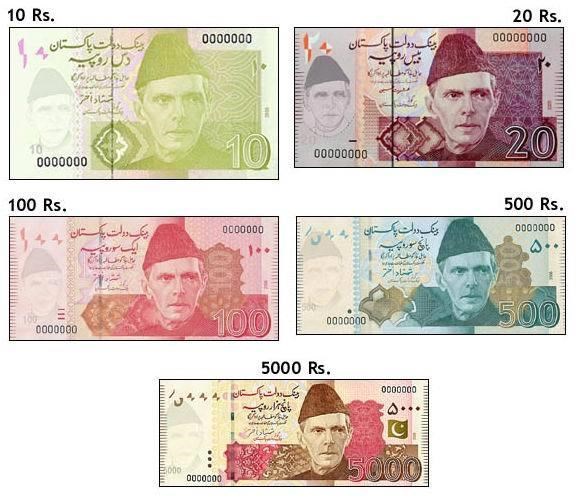 |
| Pakistan Rupees: As you can see, Jinnah is on every one (Internet) |
Introduction:
Muhammad Ali Jinnah was born on December 25, 1876 in Karachi, British India. He led the movement to create a separate homeland for Muslims under British India. He finally succeeded to form Pakistan in 1947. The Pakistani nation, in recognition of his leadership, gave him the name Quaid-e-Azam, which means the "Supreme Leader." Quaid-e-Azam also served as the first Governer-General of Pakistan. He is revered in Pakistan. His birthday is celebrated as a national holiday in Pakistan. Jinnah's Picture is printed on all the bills of the Pakistani Rupee and his portrait can be seen hanging in a lot of the government conferences. He fought for a Muslim state because he felt that Hindus were obscuring the Muslims in British India. He had a lot of different leadership traits which helped him to achieve what he achieved. Muhammad Ali Jinnah died on September 11, 1948 in Karachi, Dominion of Pakistan.
Early Life/Personal Life:
Muhammad Ali Jinnah was born into a wealthy Sindhi Family. He had 6 other siblings, 3 brothers and 3 sisters. One of his sisters, Fatima Jinnah would later play an important part in the evolution of Pakistan. Coming from a rich family, Jinnah was able to go to good schools and later was offered an apprenticeship in England. After arriving in England, he left the apprenticeship and studied Law in England. Within years he became a top lawyer, and is the youngest Indian to be called to the bar in England. In his personal life, Jinnah married a Parsi lady called Rattabai Petit. In order for the marriage to go through, Rattanbai converted to Islam. Jinnah and Rattanbai had one daughter called Dina Wadia. Rattanbai died in 1929 from illness. After Rattanbai's death, Fatima Jinnah became M.A Jinnah's close companion and advisor.
1900-1920:
In 1896 he joined the Indian National Congress, which was a political party. "At that time Jinnah did not favour outright independence but considered British influence for education, law, culture and industry as beneficial to India." Mohandas Gandhi started his non-violent movement and Hindu values practices which Jinnah differed to saying only constitutional struggle will lead to political freedom. In 1920 Jinnah left Congress because he felt that Gandhi's methods would lead it into big divisions between Hindu and Muslims and would be two communities. In 1927 he tried to negotiate with different leaders but to no avail.
1930-48:
The 1930-48 periods saw a lot of new ideas come to Jinnah. He was persuaded back into politics, to join the All-India Muslim League and re-organize the party. Jinnah was helped by Liaqat Ali Khan who would later become the first Prime-Minister of Pakistan. In the general election which took place in 1937, the All India Muslim League won most of the Muslim Electorals but didn't do as well in the Muslim majority states. Jinnah had a lot of ideas, one of them being to make an alliance with the Indian Congress, but the terms were that Congress would have to share power, accept separate electorals and the League as the representative. The terms were not accepted by the Congress and it resulted in a lot of talks between Jinnah and congress but none came to any avail and Jinnah resigned all of the Muslim League Congressmen. In 1940 the Muslim League presented the Lahore Resolution to Congress, which was to make an independent state called Pakistan. The resolution was rejected by Congress outright. Gandhi and Jinnah held talks in 1944 about a united front but those talks also failed.
In the 1946 Elections it turned out to be the same result as last time and two plans were presented. One of the plans was to make a united India and the other one was to make states by religion. The United India plan was accepted and Jinnah boycotted the Congress and called for Direct Action by Muslims for Pakistan. 7000 people died in protests and strikes but soon agreements came Jinnah's way and The States of Punjab and Bengal agreed to be part of Pakistan in 1946. In 1947 the new viceroy Lord Mountbatten and V.P Menon proposed the plan for a Muslim Dominion which included West Punjab, East Bengal, Baluchistan and Sindh to be handed over to Muslims. After a long debate Congress passed the plan and NWFP also decided to join Pakistan in July 1947. The official date for Pakistan's independence is 14th August 1947 and 15th August 1947 for India.
Conclusion:
Muhammad Ali Jinnah was a great leader and fighter for Pakistan. He is truly a hero because of the way he commanded his authority under pressure and how he addressed his nation with power. He did what was best for Pakistan and he helped each Pakistani, whether black or white, Sindhi or Punjabi and rich or poor and that is why everyone loved him. He died because of a natural illness. He achieved what he wanted to achieve and died with a lot of pride in his heart and a lot of success. He will be deeply remembered by every Pakistani.
Page created on 12/1/2008 12:00:00 AM
Last edited 12/1/2008 12:00:00 AM
